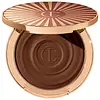Huda Beauty Tantour Contour & Bronzer Cream Versus Charlotte Tilbury Beautiful Skin Sun-Kissed Glow Bronzer
What's inside
What's inside
 Key Ingredients
Key Ingredients

 Benefits
Benefits

No benefits
 Concerns
Concerns

 Ingredients Side-by-side
Ingredients Side-by-side

Dimethicone
EmollientTriethylhexanoin
MaskingPolymethylsilsesquioxane
Ceresin
Emulsion StabilisingDimethicone Crosspolymer
Emulsion StabilisingTrimethylsiloxysilicate
EmollientPolyethylene
AbrasiveDimethicone/Polyglycerin-3 Crosspolymer
CleansingSilica
AbrasiveMica
Cosmetic Colorant7-Dehydrocholesterol
Emulsion StabilisingC10-18 Triglycerides
EmollientSodium Hyaluronate
HumectantTriolein
Skin ConditioningGlyceryl Dioleate
EmollientDipropylene Glycol
HumectantSodium Citrate
BufferingTocopherol
AntioxidantCI 77891
Cosmetic ColorantIron Oxides
Dimethicone, Triethylhexanoin, Polymethylsilsesquioxane, Ceresin, Dimethicone Crosspolymer, Trimethylsiloxysilicate, Polyethylene, Dimethicone/Polyglycerin-3 Crosspolymer, Silica, Mica, 7-Dehydrocholesterol, C10-18 Triglycerides, Sodium Hyaluronate, Triolein, Glyceryl Dioleate, Dipropylene Glycol, Sodium Citrate, Tocopherol, CI 77891, Iron Oxides
 Reviews
Reviews

Ingredients Explained
These ingredients are found in both products.
Ingredients higher up in an ingredient list are typically present in a larger amount.
Ci 77891 is a white pigment from Titanium dioxide. It is naturally found in minerals such as rutile and ilmenite.
It's main function is to add a white color to cosmetics. It can also be mixed with other colors to create different shades.
Ci 77891 is commonly found in sunscreens due to its ability to block UV rays.
Learn more about CI 77891Dimethicone is a type of synthetic silicone created from natural materials such as quartz.
What it does:
Dimethicone comes in different viscosities:
Depending on the viscosity, dimethicone has different properties.
Ingredients lists don't always show which type is used, so we recommend reaching out to the brand if you have questions about the viscosity.
This ingredient is unlikely to cause irritation because it does not get absorbed into skin. However, people with silicone allergies should be careful about using this ingredient.
Note: Dimethicone may contribute to pilling. This is because it is not oil or water soluble, so pilling may occur when layered with products. When mixed with heavy oils in a formula, the outcome is also quite greasy.
Learn more about DimethiconePolyethylene is a synthetic ingredient that helps the skin retain moisture. It is a polymer.
It is also typically used within product formulations to help bind solid ingredients together and thicken oil-based ingredients. When added to balms and emulsions, it helps increase the melting point temperature.
Silica, also known as silicon dioxide, is a naturally occurring mineral. It is used as a fine, spherical, and porous powder in cosmetics.
Though it has exfoliant properties, the function of silica varies depending on the product.
The unique structure of silica enhances the spreadability and adds smoothness, making it a great texture enhancer.
It is also used as an active carrier, emulsifier, and mattifier due to its ability to absorb excess oil.
In some products, tiny microneedles called spicules are made from silica or hydrolyzed sponge. When you rub them in, they lightly polish away dead skin layers and enhance the penetration of active ingredients.
Learn more about SilicaThis silicone is an emollient. Emollients create a thin film on the skin to prevent moisture from escaping.
It is not soluble in water and helps increase water-resistance in products.
According to a manufacturer, it can blend seamlessly with silicone oils, such as Cyclopentasiloxane.
Learn more about Trimethylsiloxysilicate